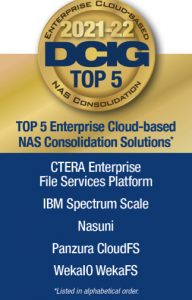Top 5 Enterprise Cloud-Based NAS Consolidation Solutions
From Ctera, IBM, Nasuni, Panzura CloudFS, WekaIO
This is a Press Release edited by StorageNewsletter.com on April 15, 2021 at 2:32 pm This report, published on April 8, 2021, was written by Todd Dorsey, analyst at DCIG LLC.
This report, published on April 8, 2021, was written by Todd Dorsey, analyst at DCIG LLC.
2021-22 DCIG TOP 5 Enterprise Cloud-based NAS Consolidation Solutions Report
DCIG announces the availability of the TOP 5 Enterprise Cloud-based NAS Consolidation Solutions report that provides guidance on Top 5 solutions organizations should consider for cloud-based NAS consolidation.
Background: The Expanding Volumes of Unstructured Data
Many enterprises struggle with managing expanding volumes of unstructured data throughout the organization. Storing, protecting, and securing this data creates challenges around cost, complexity, and scalability. Addressing these issues take cycles away from other important IT projects bringing innovation and future profits.
A new gen of SDS offers solutions to these challenges.
Background: The Difficulties Created by Unstructured Data Growth
Unstructured data growth is filling the enterprise data center and its branch offices. This growth brings many difficulties.
• Filled data centers. Data growth is creating demand for more storage capacity in the data center. However, floor space or power constraints may hinder expansion. Higher density storage systems may be available to these organizations, but the budget may not allow for the acquisition.
• Terabytes have become petabytes. Many legacy storage systems were designed when 100TB was a lot of data, but now many organizations need to manage multiple petabytes of data. At petabyte scale, storing, protecting, backing it up, and recovering it all is problematic using legacy solutions. Many IT departments struggle with finding or training staff with the experience to manage these environments. If staff leave, departments may be unable to replace these individuals, placing operations at risk.
• Remote office file data. Managing unstructured data at remote offices brings its own issues. Technology at these locations often lags behind the data center, resulting in different technology throughout the business. Branch office locations typically lack IT staff; thus, remote offices must involve others to recover lost files. File data may use up storage, and backup solutions may rob bandwidth during copies. Consider that a 1TB file directory can use 2 additional terabytes of storage for backup and offsite recovery. Further, inactive data grows as no one wants to delete files when unknowns exist. For team collaboration of files hosted at remote offices, latency can become unworkable.
• Storage proliferation. Over time, a company grows and needs expanding storage. However, the current system has not reached end-of-life. So IT adds to it. Now there are 2 systems instead of 1 to manage. Two systems become 3, 4, 5, and 10. This growth may take place because of capacity requirements or because of protocol requirements. The effect is the same: An organization ends up with a proliferation of data silos without global visibility into the file estate of its multiple, underlying systems.
• TCO. These difficulties increase the TCO for unstructured data management. Enterprises must factor in the day-to-day expenses of ongoing maintenance and upkeep. In addition, there are the not-so-obvious costs associated with acquiring new storage infrastructure, including cycles for budgeting, researching, evaluating, procuring, installing, and migrating data among multiple storage systems.
The explosive growth of unstructured data creates costly, difficult-to-manage problems using legacy approaches to file data management.
SDS for Cloud-Based NAS Consolidation
Cloud-based NAS consolidation, based on enterprise SDS, offers a solution for providing fast, flexible, usable access to all an organization’s file data for all of its end users.
Enterprise Cloud-Based NAS Consolidation Solutions
In preparing this report, DCIG evaluated 20 SDS solutions for a cloud-based NAS consolidation use case.
Solutions evaluated:
• CTERA Enterprise File Services Platform
• Commvault Hedvig Distributed Storage Platform
• DataCore vFilO
• Dell EMC IsilonSD
• IBM Cloud Object Storage
• IBM Spectrum Scale
• Nasuni
• NetApp ONTAP Select and Cloud Volumes ONTAP
• Panzura CloudFS
• Qumulo File Data Platform
• Scality RING8
• Storidge Container IO
• StorONE S1 Enterprise Storage Platform
• SUSE Enterprise Storage
• Tiger Technology Tiger Bridge
• Tintri NexentaStor
• Veritas InfoScale Enterprise
• VMware vSAN
• WekaIO WekaFS
• Zadara VPSA
The general categories under which these features fell included:
• Deployment capabilities
• Data protection
• Product and performance management
• Documentation
• Technical support
• Licensing and pricing
Based on these criteria, the following storage solutions earned a DCIG TOP 5 award (in alphabetical order):
• CTERA Enterprise File Services Platform
• IBM Spectrum Scale
• Nasuni
• Panzura CloudFS
• WekaIO WekaFS














 Subscribe to our free daily newsletter
Subscribe to our free daily newsletter

